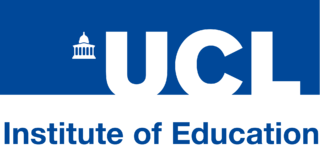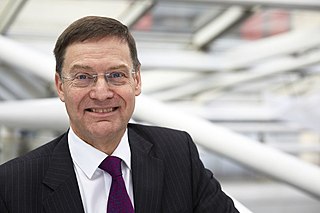Related Research Articles
Musicology is the scholarly analysis and research-based study of music. Musicology departments traditionally belong to the humanities, although some music research is scientific in focus. Some geographers and anthropologists have an interest in musicology so the social sciences also have an academic interest. A scholar who participates in musical research is a musicologist.

Sheffield Hallam University (SHU) is a public research university in Sheffield, South Yorkshire, England. It is based on two sites; the City Campus is located in the city centre near Sheffield railway station, while the Collegiate Crescent Campus is about two miles away in the Broomhall Estate off Ecclesall Road in south-west Sheffield.

Helena Ann Kennedy, Baroness Kennedy of The Shaws, QC, FRSA, HonFRSE, is a Scottish barrister, broadcaster, and Labour member of the House of Lords. She served as Principal of Mansfield College, Oxford from 2011 to 2018.

The UCL Institute of Education (IOE) is the education school of University College London (UCL). It specialises in postgraduate study and research in the field of education and is one of UCL's 11 constituent faculties. Prior to merging with UCL in 2014, it was a constituent college of the University of London. The IOE is ranked first in the world for education in the QS World University Rankings, and has been so every year since 2014.

Margaret Ann Boden, OBE, ScD, FBA is a Research Professor of Cognitive Science in the Department of Informatics at the University of Sussex, where her work embraces the fields of artificial intelligence, psychology, philosophy, and cognitive and computer science.
Music psychology, or the psychology of music, may be regarded as a branch of both psychology and musicology. It aims to explain and understand musical behaviour and experience, including the processes through which music is perceived, created, responded to, and incorporated into everyday life. Modern music psychology is primarily empirical; its knowledge tends to advance on the basis of interpretations of data collected by systematic observation of and interaction with human participants. Music psychology is a field of research with practical relevance for many areas, including music performance, composition, education, criticism, and therapy, as well as investigations of human attitude, skill, performance, intelligence, creativity, and social behavior.
Susan Roaf is a British architect, scholar and Professor of Architectural Engineering at Heriot-Watt University in Edinburgh since 2005. She is best known for her work on "adapting buildings and cities for climate change."

Susan Sutherland Isaacs, CBE was a Lancashire-born educational psychologist and psychoanalyst. She published studies on the intellectual and social development of children and promoted the nursery school movement. For Isaacs, the best way for children to learn was by developing their independence. She believed that the most effective way to achieve this was through play, and that the role of adults and early educators was to guide children's play.
LouAnne Johnson is an American writer, teacher and former U.S. Navy journalist. She spent seven years as a radio-TV broadcaster and one year as a Marine Corps Officer, after graduating as Honor Woman in her Marine Corps OCS class. She was the first woman inducted into the DINFOS Hall of Fame.

The Notre Dame Institute of Education (NDIE) is a teacher education facility in Saddar Town in Karachi, Sindh, Pakistan.
May Smith OBE was a British Industrial psychologist from Hulme, Manchester. She received a bachelor's degree in 1903 and later received a Doctor of Science degree in 1930. Throughout her career, she taught at colleges as well as performing important research in the field of industrial psychology. She subjected herself to her own trials in her research on fatigue. She worked alongside other researchers to find the effects of alcohol and opium on efficiency as well as research on telegraphist's cramp. She was an investigator at the Industrial Health Research Board from 1920 to 1944. She held several positions on the executive of the British Psychological Society.

Dame Celia Mary Hoyles, is a British mathematician, educationalist and Professor of Mathematics Education at University College London (UCL), in the Institute of Education (IoE).
Ann Phoenix, is a British psychologist and academic, whose research focuses on psychosocial issues related to identity. She is Professor of Psychosocial Studies at the Institute of Education, University College London. She was previously ESRC Professorial Fellow for the Transforming Experiences research programme. She was previously Co-Director of the Thomas Coram Research Unit, and Reader in Psychology at the Open University.
Marilyn Leask is an academic and author who researches in education in the UK. She is Professor of Education at De Montfort University, and was previously Professor of Educational Knowledge Management at the University of Bedfordshire and a professor at Brunel University. Many of her works involve the educational use of information and communications technology (ICT).

Professor Sir Chris Husbands is a British academic, educationist, university leader and public servant, who has been Vice-Chancellor of Sheffield Hallam University since January 2016.
Richard John Hallam MBE is an English musician and music educator. He is best known for his work as the Director of Music in Oxfordshire from 1987 to 2008 and for advising successive UK governments on music education policy from 2003 to 2012. This included serving as the National Music Participation Director for the Department for Education from 2008 to 2011. He is also well known for his work in relation to El Sistema internationally.

Jeanne Bamberger is the American Professor Emerita of Music and Urban Education at the Massachusetts Institute of Technology, and Adjunct Professor of Music at the University of California, Berkeley. Her research interests include music cognitive development, music theory and performance, teacher development, and the design of text and software materials that foster these areas of development.

Adam Ockelford is a Professor of Music and Director of the Applied Music Research Centre at the University of Roehampton, London. He wrote the official biography of Derek Paravicini entitled "In the Key of Genius: The Extraordinary Life of Derek Paravicini".
Theodora Matilda Morton MBE was an English welfare worker. She led the new school care service when it was established based on the ideas of Margaret Frere.
References
- 1 2 3 4 5 "Susan Hallam".
- ↑ "Susan Hallam - Google Scholar".
- 1 2 3 4 "Honorary life membership".
- ↑ "New year honours 2015: the full list".
- 1 2 3 4 5 "Susan Hallam".
- 1 2 "One on one… with Susan Hallam".
- ↑ "Susan Hallam - Scopus".
- ↑ "Here Today, Here Tomorrow: Helping Schools to Promote Attendance (Paperback)".
- ↑ "Homework: The Evidence".
- ↑ "2019 SEMPRE Lifetime Achievement Award recipients".